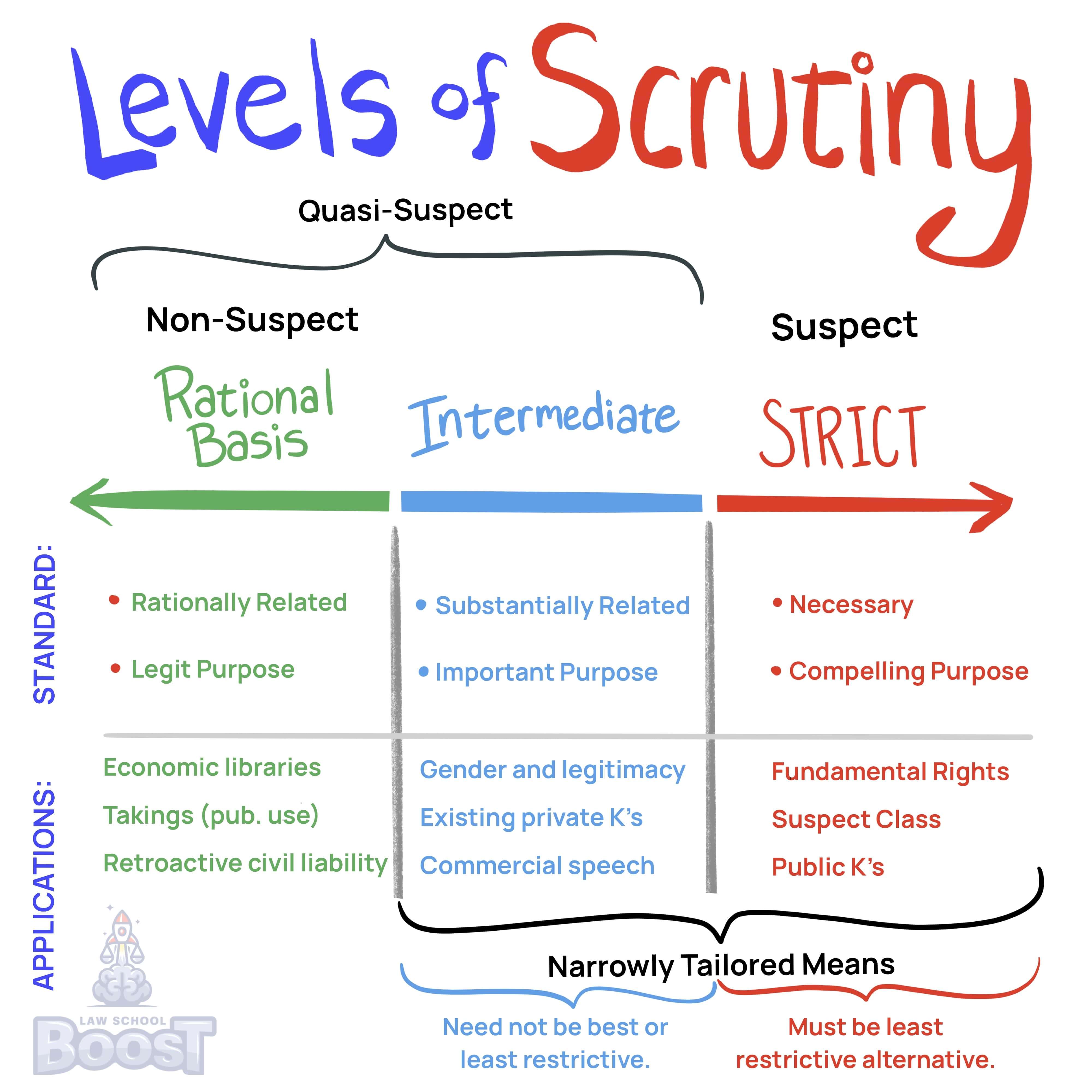🇺🇸
Constitutional Law • Contracts Clause
CONLAW#072
Legal Definition
Intermediate Scrutiny. State legislation that substantially impairs an existing private contract is invalid unless the legislation: (1) serves an important and legitimate purpose, and (2) is a reasonable and narrowly tailored means of promoting that interest.
Plain English Explanation
The Contracts Clause prevents states from passing laws that destroy existing private contracts. However, there is an exception if the state has a very good reason for the law that impairs contracts. The court will apply "intermediate scrutiny" to analyze whether the law is allowed or not. Under this test, the law must: (1) address an important public purpose, (2) be substantially related to achieving that purpose, and (3) impair contracts no more than necessary. This level of scrutiny balances protecting private contracts with allowing states to pass laws for legitimate public interests. For example, a state law limiting rent prices may be justified to ensure affordable housing, even if it alters existing leases. But the law must be narrow and reasonable, not go beyond what is needed to achieve its goal.
Hypothetical
Hypo 1: Amid a severe economic crisis, Hypofornia passes the "Homeowner Relief Act," which allows homeowners facing foreclosure an additional 12 months to redeem their homes, a move aimed at combating the widespread loss of housing. Bob, who had lent money to Sam for Sam's home under a mortgage agreement specifying that foreclosure would result in immediate possession by Bob, finds this new law delays his ability to take possession of Sam's home following foreclosure. Sam, struggling financially, welcomes the relief, hoping to use the extra time to find a way to keep his home. Result: In this situation, a court would examine whether the "Homeowner Relief Act" serves an important public interest by providing temporary relief to homeowners in an economic crisis. The court would assess if the law is reasonably related to its goal of economic stability and whether it's a fair and necessary response to the crisis. Given the temporary and emergency nature of the law, it is likely that the court would find the act to be a reasonable exercise of state power to protect its citizens during an unprecedented economic downturn, thus allowing Sam additional time to redeem his home without Bob being able to claim an immediate right to possession.
Hypo 2: New Hypoland enacts a law setting a maximum price that natural gas producers can charge to pipeline companies, aiming to stabilize the energy market and protect consumers from price gouging. Bob, a natural gas producer, has an existing contract with Sam, a pipeline company, to sell natural gas at a rate higher than the new cap. This law threatens to disrupt their agreement, leading Bob to challenge the law, arguing it unfairly impairs his contract with Sam and limits his profits. Result: In evaluating this scenario, a court would consider whether New Hypoland's law serves a significant and legitimate public purpose by attempting to stabilize the energy market and protect consumers. The court would look into whether setting a maximum price is a reasonable method to achieve these goals, taking into account the broader context of the energy crisis. The law's impact on existing contracts like Bob's would be weighed against the necessity of ensuring a stable, affordable energy supply for the public. Given the law's aim to address a pressing public concern and its rational approach to doing so, it's possible the court would uphold the law as a valid exercise of the state's regulatory authority, even though it alters the terms of Bob and Sam's contract. However, if the court finds that the interference with Bob’s contract is too substantial without sufficient justification, it could rule the law as an unconstitutional impairment of contract.
Hypo 2: New Hypoland enacts a law setting a maximum price that natural gas producers can charge to pipeline companies, aiming to stabilize the energy market and protect consumers from price gouging. Bob, a natural gas producer, has an existing contract with Sam, a pipeline company, to sell natural gas at a rate higher than the new cap. This law threatens to disrupt their agreement, leading Bob to challenge the law, arguing it unfairly impairs his contract with Sam and limits his profits. Result: In evaluating this scenario, a court would consider whether New Hypoland's law serves a significant and legitimate public purpose by attempting to stabilize the energy market and protect consumers. The court would look into whether setting a maximum price is a reasonable method to achieve these goals, taking into account the broader context of the energy crisis. The law's impact on existing contracts like Bob's would be weighed against the necessity of ensuring a stable, affordable energy supply for the public. Given the law's aim to address a pressing public concern and its rational approach to doing so, it's possible the court would uphold the law as a valid exercise of the state's regulatory authority, even though it alters the terms of Bob and Sam's contract. However, if the court finds that the interference with Bob’s contract is too substantial without sufficient justification, it could rule the law as an unconstitutional impairment of contract.
Visual Aids



